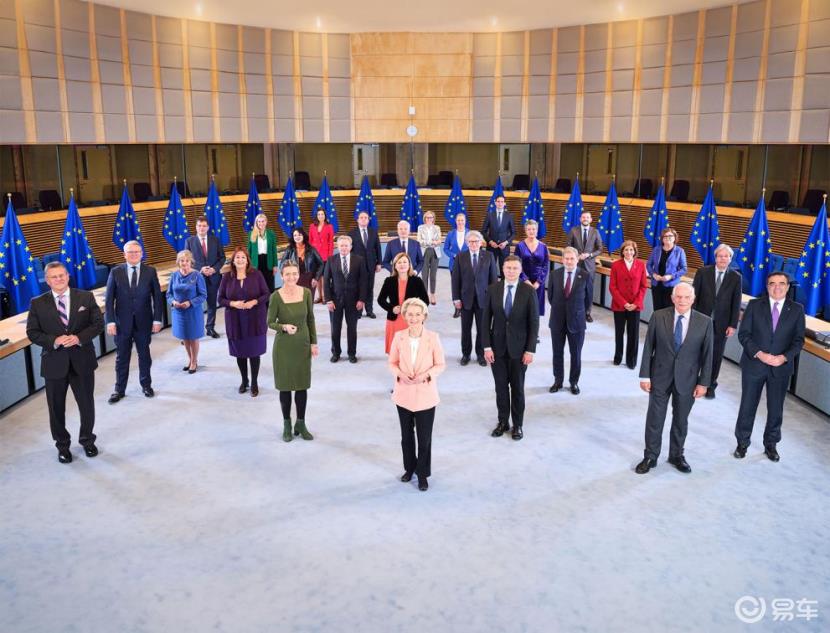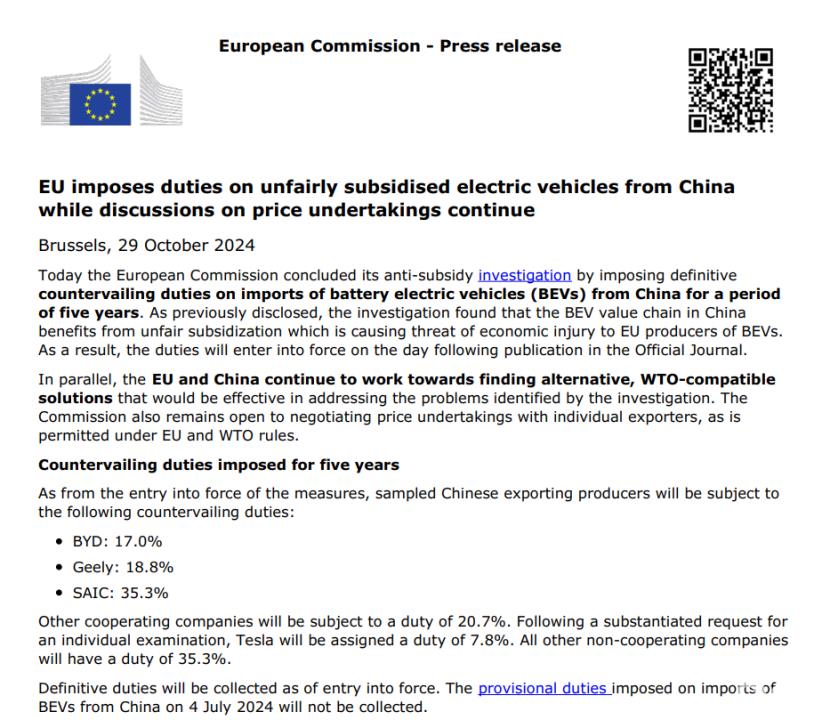The relevant decision is expected to be published in the Official Gazette of the European Union on October 30, local time, and the tariff will take effect on October 31.
On October 29th, the European Commission announced that it had ended its countervailing investigation on electric vehicles in China and decided to impose a five-year final tariff on pure electric vehicles imported from China. The relevant decision is expected to be published in the Official Gazette of the European Union on October 30, local time, and the tariff will take effect on October 31.

Image source: European Commission
The EU has disclosed the final tariff level to be imposed on Chinese-made electric vehicles. Among them, tariffs of 17.0%, 18.8% and 35.3% will be imposed on BYD, Geely and SAIC, which have cooperated with the sampling survey;
In addition, a tariff of 20.7% will be imposed on China electric vehicle manufacturers who cooperate with the EU investigation but have not yet been sampled;
Impose a 35.3% tariff on other China electric vehicle manufacturers who do not cooperate with the investigation;
Tesla’s electric cars produced in China will be subject to a tariff of 7.8% after sufficient reasons are put forward to request a separate review.
The EU will formally levy the above-mentioned final tariffs from the effective date of the tariffs. At the same time, the EU decided not to levy the previously announced temporary tariffs on electric vehicles imported from China from July 4, 2024.

Image source: European Commission
In the future, the European Commission will continue to monitor the effectiveness of existing tariff measures, including ensuring that these measures will not be circumvented.
Any automobile export manufacturer that cooperates with the EU investigation has the right to request an accelerated review and determine its separate tax rate.
The above tariff measures will expire at the expiration of five years, unless the expiration review is initiated before the expiration of five years.
If the importer thinks that its automobile export manufacturer has not received the subsidy, or the subsidy is lower than the tax paid by the importer, he can ask for a tax refund. Such requests shall be supported by sufficient reasons and corresponding evidence.
At the same time, the EU and China are still working hard to find a solution to substitute tariffs in line with WTO regulations, so as to effectively offset the impact of China’s subsidies. The European Commission is still willing to negotiate price commitments with auto exporters separately according to the regulations of the EU and WTO.
Up to now, the European Commission has conducted eight rounds of technical negotiations with China to seek a tariff alternative, and indicated that negotiations can continue after the final tariff collection. The two sides are discussing the possible lowest price commitment for imported cars. Although the European Commission said that the two sides "still have major differences", both sides agreed to hold the next round of negotiations.
Valdis Dombrovskis, Executive Vice-President and Trade Commissioner of the European Commission, said: "The EU remains a global leader in open, fair and rule-based trade. We welcome competition, including in the field of electric vehicles, but this competition must be based on a level playing field. After strict investigation, we have taken these appropriate and targeted measures to defend fair market practices and European industrial base. At the same time, we are still open to possible effective alternatives. "
At present, European automakers are coping with the influx of low-cost electric vehicles from competitors in China. The European Commission estimates that the share of China automobile brands in the European automobile market has increased from less than 1% in 2019 to 8%, and may reach 15% in 2025. The European Commission also said that the price of electric vehicles made in China is usually 20% lower than that made in the European Union.
However, according to CPCA data, in the first three quarters of this year, China’s exports of electric vehicles to the EU decreased by 7% year-on-year, but in August and September before the final tariff on electric vehicles to China was implemented, China’s exports of electric vehicles to the EU rose by more than 33% year-on-year.